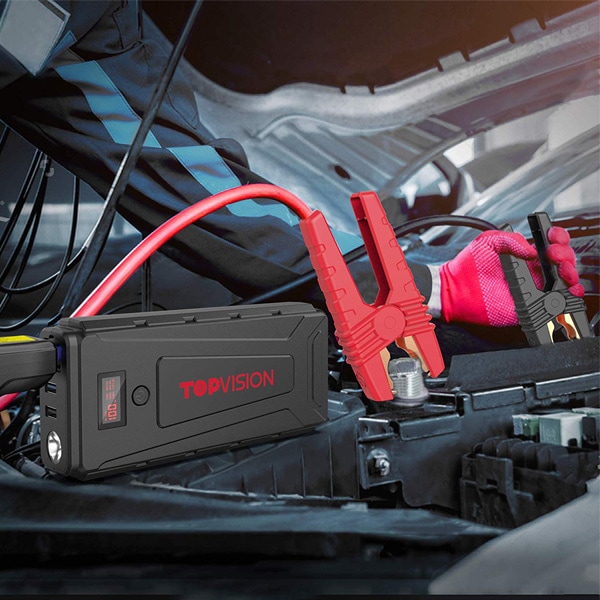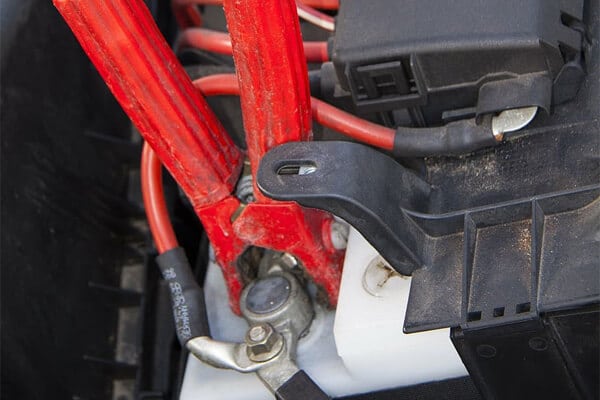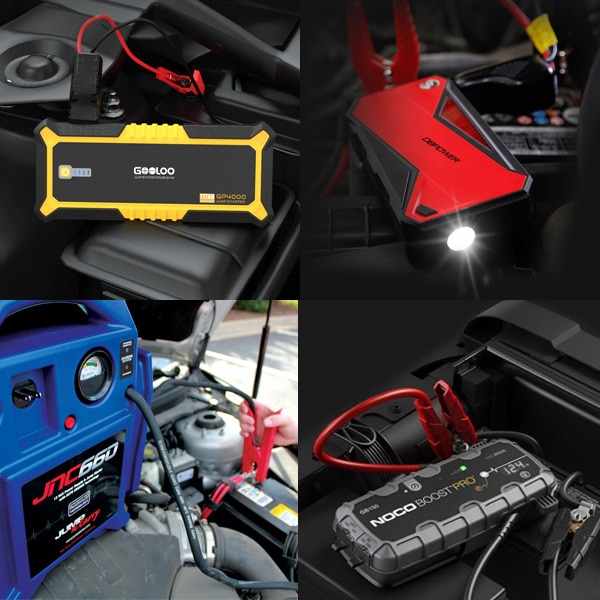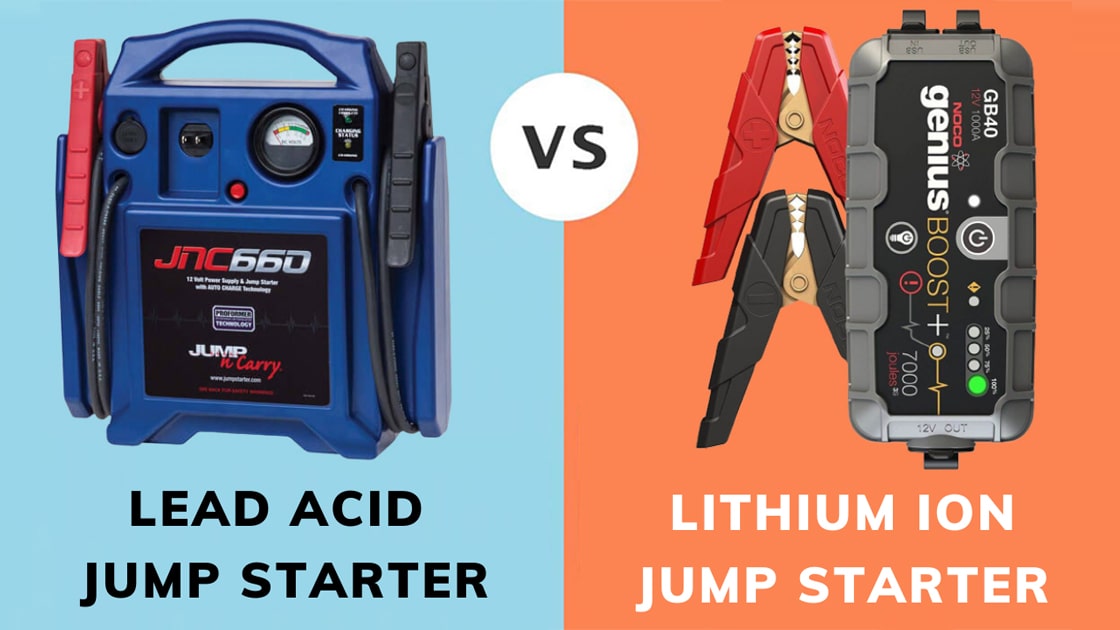Introduction
A jump starter is an essential device that every car owner needs. Lead-acid batteries were widely known in the past, but now lithium-ion batteries are getting the same amount of attention. So which one is better?
Let’s take a look at the difference between lead-acid and lithium-ion jump starters!

A jump starter is a handy device that every car owner needs
What Is A Lead Acid Jump Starter?
The traditional lead-acid jump starter uses lead-acid batteries to function. They store and deliver electrical energy using lead plates and a sulfuric acid-based liquid.
These batteries come in various sizes and types, including standard crank and deep-cycle AGM models. They’re commonly set up with one battery for 12-volt jump packs or two batteries connected in parallel and series for both 12 and 24-volt kits.
This type is dependable and easy to maintain. That’s why it is a terrific source of energy as well as a good supply of power for car batteries.
What Is A Lithium-Ion Jump Starter?
Lithium-ion jump starters get their name from their battery, enabling you to start your automobile or charge items that require energy.

Lithium-ion jump starter is an energy source for many devices
They are at the heart of many advanced technologies today. It’s the sort of energy found in electric automobiles, smartphones, tablets, laptops, and a wide range of other technological and electrical equipment.
The obvious benefit of these lithium-ion jump starters is their portability, as it is only slightly larger than a pack of cigarettes. They often come in compact sizes, so they are easy to carry or store in your car’s trunk.
Related:
- How Many Amps Is A Car Battery to Ramp up Your Engine?
- A Complete Comparison Of Lithium Ion Vs Lithium Polymer Batteries
- How To Jump A Car Without Another Car?
- How To Use A Jump Starter: Detailed Guideline For The Unprofessional
What Is The Difference Between Lead Acid Vs Lithium Ion Jump Starter?
Cost
Because of its higher technology and smaller size, lithium-ion jump starters have more economic drawbacks than lead-acid ones.
Lead acid is a popular low-cost battery chemical that can be purchased in big quantities with minimal concern for supply security and in a wide range of sizes.
In addition, lead-acid batteries are also ideal for large-scale stationary applications with plenty of space and low energy requirements.
Energy
Lithium-ion batteries can produce up to 4X to 6X more power than lead-acid batteries for the same amount of space and weight.
When powered by lithium-ion technologies, a vehicle with a high energy density has a much longer range. This means the user does not need to charge their car’s batteries as frequently.
Size
The traditional style lead-acid jump starter tends to be bulkier than the lithium-ion one.
In other words, the lead-acid battery could occupy up to 10 times the volume of the lithium-ion battery, and it’s also heavier.
As a result, using a lithium-ion jump starter frees up room for other critical payloads. For example, space in your car’s trunk or more packages in an electric delivery truck.
Charging
A lead-acid battery can take up to 10 hours to charge. That means lithium-ion batteries can take anywhere from a few minutes to 3 hours, depending on their size.
Meanwhile, lithium-ion technologies can tolerate a higher current rate, allowing them to charge more quickly than lead-acid batteries.
Cycle Life
The life cycle of a battery relates to how many times it may be fully charged and drained before it needs to be replaced. Longer cycle life equates to a longer lifespan.
The cycle life of lithium-ion jump starters is roughly double that of lead-acid jump starters. Because each model includes different types of materials, exact quantities will vary based on the model.
Level Of Maintenance
Lead-acid jump starters require more maintenance than lithium-ion ones. They rapidly lose charge and weaken. Meanwhile, lithium-ion batteries are steadier. They call for far less attention and may operate for longer periods of time without needing to be recharged.
Climate Resistance
In cold temperatures, lead-acid batteries will most likely lose their capacity. On the other hand, lithium-ion batteries are substantially more efficient at low degrees.
Furthermore, the discharge rate also has an impact on lead-acid jump starter performance.
Safety
The traditional style lead-acid jump starters usually don’t have any guarantee. Since the devices aren’t sealed, they can leak hydrogen when charged.
Conversely, lithium-ion jump starters emit no pollutants, suited for all applications. They also have control mechanisms to keep the battery safe.
Lead Acid Jump Starter – Pros And Cons
- Heavy-duty
- Can powers vehicles, electronics, and tools
- Have similar features to a battery
- Economical
- Heavy and bulky, awkward to move around
- Lose its ability after every charge
- Take longer to charge
- Limited “useable” capacity
- Shorter life cycle
Lithium-Ion Jump Starter – Pros And Cons
- Compact and lightweight, more portable
- Have more capacity
- Hold a higher charge than a supercapacitor
- Don't have to recharge as often
- Longer life cycle
- High volatile-matter material
- Get overheat easily
- Can't function with heavy-duty vehicles
Which Jump Starter Is Better For You?
As a matter of fact, every automobile owner should have at least one jump starter. However, choosing a suitable jump starter should depend on your purpose of use.

You should choose your jump starter depending on your purpose
If you have a heavy-duty car or are on a tight budget, a lead-acid jump starter will be perfect for you. On the other hand, lithium-ion models are becoming more and more popular with car owners.
Jump starters using lithium-ion batteries have improved technology, ensure a longer life span, and are more transportable when compared to the traditional lead-acid ones.
That’s why a lithium-ion jump starter should always be the first choice when seeking a new energy device.
We hope that the lead-acid vs lithium-ion jump starter comparison above has helped you to learn more about automotive gadgets to support your car.
You can also check product reviews and do more research to find out what is the best lithium-ion jump starter on the market these days!
Further Reading:
WHAT'S NEW
The best AGM battery chargers will be the ideal option to revive your flat battery without relying on professional help. These handy high-tech chargers are extremely beneficial because they offer...
The Genius Boost GB40 is popular because of its ability to help boost your vehicle when it has battery issues. Many of our customers wonder why the Noco GB40 can work greatly like so. So, we have...

